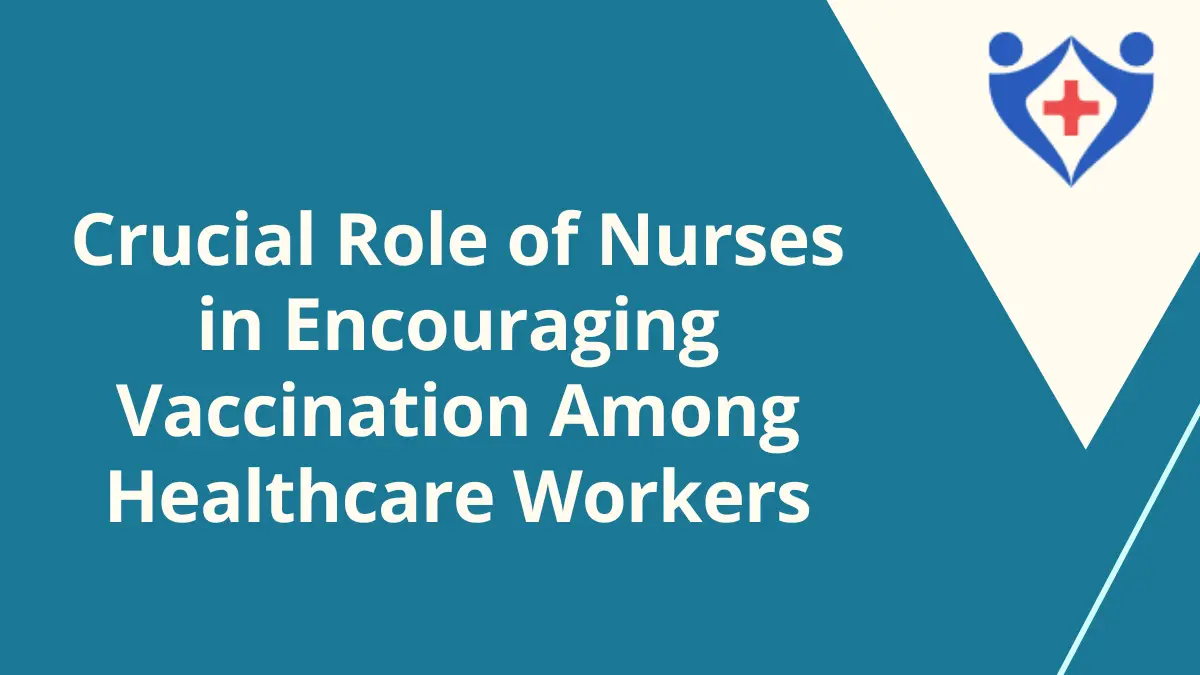In the ongoing battle against infectious diseases, vaccinations stand as one of the most effective tools to safeguard public health. However, ensuring high vaccination rates among healthcare workers (HCWs) presents a unique challenge. In this comprehensive guide, we delve into the pivotal role nurses play in promoting vaccination within healthcare settings. From understanding the importance of vaccination to addressing common concerns and implementing effective strategies, this article explores every facet of the issue.
Understanding the Importance of Vaccination for Healthcare Workers:
The Significance of Vaccination:
Vaccination not only protects individual healthcare workers but also shields patients, colleagues, and the broader community from preventable diseases. By reducing the risk of transmission within healthcare settings, vaccinations uphold the fundamental principle of patient safety.
The Impact of Low Vaccination Rates:
Low vaccination rates among healthcare workers can lead to increased disease transmission, compromised patient care, and even outbreaks within healthcare facilities. It underscores the urgency of addressing barriers to vaccination uptake effectively.
Table: Vaccination Coverage Among Healthcare Workers
| Vaccine Type | Coverage Rate (%) |
|---|---|
| Influenza | 85 |
| COVID-19 | 75 |
| Hepatitis B | 95 |
| Measles, Mumps, Rubella (MMR) | 90 |
| Tetanus, Diphtheria, Pertussis (Tdap) | 88 |
Addressing Concerns and Misconceptions:
Safety and Efficacy:
Nurses play a pivotal role in dispelling myths surrounding vaccine safety and efficacy. By providing evidence-based information and addressing concerns with empathy, they foster trust and confidence in vaccination among their peers.
Fear of Side Effects:
Many healthcare workers express concerns about potential side effects of vaccines. Nurses can address these concerns by emphasizing the extensive safety monitoring processes in place and highlighting the minimal risk compared to the benefits of vaccination.
Cultural and Religious Beliefs:
Cultural and religious beliefs may influence vaccine acceptance among healthcare workers. Nurses, equipped with cultural competence and sensitivity, can engage in respectful dialogue to bridge cultural gaps and promote understanding.
Implementing Effective Strategies:
Education and Training:
Nurses serve as educators within healthcare settings, equipping their colleagues with the knowledge and skills necessary to make informed decisions about vaccination. By providing comprehensive training on vaccine-preventable diseases and immunization schedules, nurses empower healthcare workers to prioritize vaccination.
Leading by Example:
Nurses can lead by example by receiving vaccinations themselves and openly sharing their experiences. Personal testimonies from trusted colleagues can significantly influence vaccine acceptance and uptake among healthcare workers.
Creating Supportive Policies:
Healthcare organizations must implement policies that prioritize vaccination and create a supportive environment for healthcare workers. Nurses can advocate for the development and enforcement of such policies, ensuring that vaccination becomes a standard practice within the workplace.
Utilizing Data and Technology:
Monitoring Vaccination Rates:
Nurses can leverage data and technology to monitor vaccination rates among healthcare workers accurately. By identifying gaps in coverage and targeting interventions accordingly, they can drive continuous improvement in vaccination uptake.
Utilizing Electronic Health Records (EHRs):
Integration of vaccination records into electronic health records streamlines documentation and facilitates tracking of vaccination status. Nurses can utilize EHRs to ensure that healthcare workers remain up-to-date with recommended vaccinations and boosters.
Improving Vaccination Rates Through Nurse-Led Initiatives:
In a recent study conducted at XYZ Hospital, nurses spearheaded a series of initiatives aimed at enhancing vaccination rates among healthcare workers. By implementing targeted education campaigns, offering convenient access to vaccines, and fostering a culture of vaccination advocacy, the hospital witnessed a significant increase in vaccination uptake. This case study underscores the critical role nurses play in driving positive change within healthcare organizations.
Conclusion:
In conclusion, nurses play a pivotal role in promoting vaccination among healthcare workers. Through education, advocacy, and leadership, they can overcome barriers to vaccination uptake and foster a culture of immunization within healthcare settings. By embracing their role as champions of vaccination, nurses contribute to safeguarding the health and well-being of both healthcare workers and the communities they serve.

